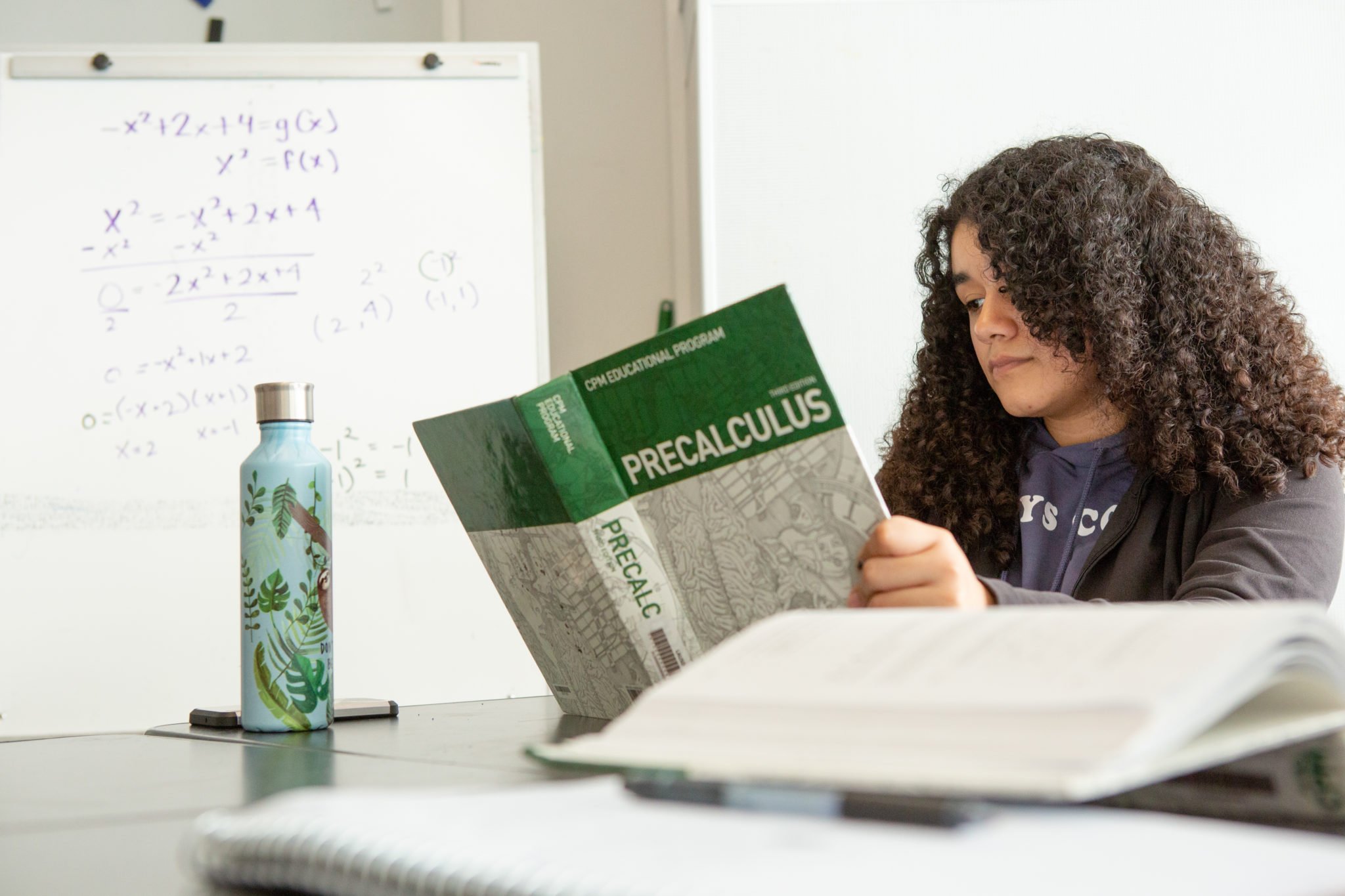Why You Need To keep Up In Math Class
By Vickie Barone
Want to do less ACT/SAT Math Prep? Keep Up in Class!
While many colleges have moved away from requiring SAT or ACT scores for admissions, most of schools are still accepting them - and many value having test scores as way to check for grade inflation. Even in a test-optional lanscape (which is now becoming less optional) getting a great score ACT or SAT score can absolutely give you an edge when applying to selective colleges. And if you’ll be applying to colleges for STEM, business, and certain arts and science majors, admissions reps will be looking for strong math performance. (See more below about this.)
It is worth it to prepare for the SAT or ACT, because, with some dedicated effort, most students can significantly improve their scores, but the #1 best way to prepare for the ACT or SAT math sections is by keeping up in math class.
Students who keep up with math classes require less ACT/SAT prep
When you begin preparing for the math section of the Digital SAT or ACT with a firm foundation of the math concepts tested, it makes a world of difference. Rather than hard work, it feels more like practicing skills you already have, refreshing some skills you haven’t used in a while, and strategizing about timing and how to best approach certain types of questions. It shouldn’t feel as if you are learning the concepts from scratch. There is absolutely no substitute for staying on top of the work in your math classes and working hard to really understand and master the material.
Math concepts & skills build on each other
THE NUMBER ONE factor affecting ACT/SAT math performance is a student’s relationship with their math classes in high school. Math is a subject where everything builds on the previous material. It is important for students to feel solid at each step along the way, so they can build their own understanding. Too often, a student will get behind with their math coursework and then they find it so difficult to catch up that they simply give up.
Why do kids fall behind in math class?
Missing several days of class: especially in the post-COVID era when students are missing more school than ever. Missing a few days of math class, where new skills and concepts are taught sometimes daily, can make it feel impossible to catch up.
Having a teacher who doesn’t check or give grades for homework. In many cases, students in these classes will (understandably!) focus their efforts in other classes where their work is checked and graded. So, their math assignments pile up and they miss opportunities to practice new skills. This is a tricky one to address, but it can help to have a conversation with the teacher or math department chair.
Being in a math class that is not the appropriate level. Many students who’ve been doing well (or well enough) in honors math in middle school or early high school, find themselves in a math class where they (atypically for them) simply cannot keep up. This can have a devastating effect on a student’s performance and confidence. It is often better to switch to a different level math class and build skills and confidence, rather than sticking with a class where you feel as if you’re drowning.
Having a teacher who is not a good fit. Some teachers and students do not work well together, and this can lead to a decline in student motivation and achievement. A student who gives up on understanding their teacher (sometimes with good reason!) is not in a good position to learn. We don’t always have the option of choosing or changing teachers, but a great tutor can support the student to mitigate the effects of a bad-fit teacher.
When students find themselves in one or more of these situations, they can get off-track and fall behind. Then, when it is time for a test or quiz, they will try to cram and prepare just in time to get through it and do well enough. (Many students can actually get good enough grades this way, but this is not a great system for the long term.) The problem with this approach is that it does not lead to real understanding and retention of the material. I have worked with kids who were used to working this way, and within just a few days of the test they crammed for, they will have completely forgotten concepts and procedures. These students are not truly mastering the material.
Falling behind in math may Limit Your choices for many colleges and certain majors
If you look at the Wesleyan University Class Profile (acceptance rate 16%) for the class of 2027, though only 58% of admitted students submitted ACT or SAT scores, a whopping 85% of their accepted students took calculus in high school.
At Santa Clara University (acceptance rate 52%) students all engineering and business majors are required to either have taken calculus in high school or to take it at Santa Clara. But this requirement doesn’t only apply to those majors. Students who want to pursue majors in the following majors in their arts and science college also have to take calculus: bio, chem, CS, Econ, Enviro. Sci., Math, Neuroscience, physics, public health. And for those majors, if you haven’t already taken calculus, Santa Clara will require you to take a calculus readiness exam!
Falling behind in math iS a confidence buster
Once a student falls behind in math class, the problem usually snowballs. Grades suffer, confidence diminishes, and the cycle perpetuates itself. Of course, this has a huge effect on preparedness for the SAT or ACT. When a student begins test prep from a place of low confidence and with large gaps in understanding of underlying math concepts, those are some big hurdles to overcome.
Signs You Are Falling Behind In Math
Are your test and quiz scores erratic?
Do you feel like as if you’re trying to learn everything the night before a test or quiz?
Are you missing or ignoring math assignments regularly?
Have you missed several days of class and you’re feeling lost upon returning?
Do your eyes glaze over during math class and you feel like giving up on trying to understand?
Did you answering yes to any of these questions? If so now is the time to get help. Go to your teacher and ask for extra help outside of class time. See if your school has any tutoring resources. Find a private tutor (we can help!) who can help you get caught up and learn the skills you need to succeed. With a little bit of assistance, there is hope for you to get back on track. You can be another one of the many success stories I have seen in my decades of tutoring math.
The best thing you can do throughout your middle and high school years is if you notice the signs that your math coursework is slipping is to get help — act as soon as possible to get back on track.
Resources
Listen to what admissions reps from Clark University, Dartmouth, and Yale Universities have to say about the current role of standardized testing in Dartmouth’s Admissions Beat podcast (scroll to Season 4, Episode 8)
Resources
Listen to what admissions reps from Clark University, Dartmouth, and Yale Universities have to say about the current role of standardized testing in Dartmouth’s Admissions Beat podcast (scroll to Season 4, Episode 8)

